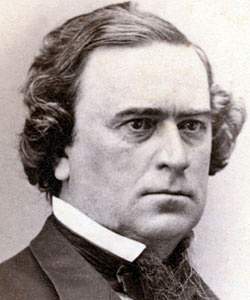Willard Saulsbury, Sr. (Dickinson Chronicles)
Scholarship
Willard Saulsbury was born as the youngest of three sons of William and Margaret Smith Saulsbury, wealthy landowners in Kent County, Delaware, on June 2, 1820. Saulsbury prepared at Delaware College at Newark, and attended Dickinson College in Carlisle, Pennsylvania between 1839 and 1840 in the class of 1842 before leaving to study law. His middle brother, Eli Saulsbury, also attended Dickinson.
He opened a practice in Georgetown, Delaware in 1845. He became the attorney-general of Delaware in 1850, thus launching a career in politics as a Democrat. He was present at the Democratic convention in Cincinnati in 1856 that nominated James Buchanan for the presidency; for his support he was appointed to the United States Senate in 1859. He defended slavery but supported the preservation of the Union. He vigorously opposed arrests for disloyalty in Delaware, supported Senator Bright of Indiana in his fight against expulsion for treason in 1862, and protested Lincoln's suspension of the writ of habeas corpus.
In 1871, the three Saulsbury brothers vied for the Senate seat Willard held and he eventually gave his support to Eli, who was elected. In 1873, he was appointed as Chancellor of Delaware and remained in this post for the rest of his life.
In May 1850, he married Annie Milby Ponder of another prominent state family. It was her brother who as governor gave Saulsbury his last appointment. The couple had two sons, one of whom became Delaware secretary of state and the other a United States senator. Willard Saulsbury died in Dover, Delaware on April 6, 1892.
He opened a practice in Georgetown, Delaware in 1845. He became the attorney-general of Delaware in 1850, thus launching a career in politics as a Democrat. He was present at the Democratic convention in Cincinnati in 1856 that nominated James Buchanan for the presidency; for his support he was appointed to the United States Senate in 1859. He defended slavery but supported the preservation of the Union. He vigorously opposed arrests for disloyalty in Delaware, supported Senator Bright of Indiana in his fight against expulsion for treason in 1862, and protested Lincoln's suspension of the writ of habeas corpus.
In 1871, the three Saulsbury brothers vied for the Senate seat Willard held and he eventually gave his support to Eli, who was elected. In 1873, he was appointed as Chancellor of Delaware and remained in this post for the rest of his life.
In May 1850, he married Annie Milby Ponder of another prominent state family. It was her brother who as governor gave Saulsbury his last appointment. The couple had two sons, one of whom became Delaware secretary of state and the other a United States senator. Willard Saulsbury died in Dover, Delaware on April 6, 1892.
John Osborne and James W. Gerenscer, eds., "Willard Saulsbury," Dickinson Chronicles, http://chronicles.dickinson.edu/encyclo/s/ed_saulsburyW.htm.
Willard Saulsbury, Sr. (Congressional Biographical Directory)
Reference
SAULSBURY, Willard, Sr., (brother of Eli Saulsbury, father of Willard Saulsbury, Jr.), a Senator from Delaware; born in Mispillion Hundred, Kent County, Del., June 2, 1820; attended the common schools, Dickinson College, Carlisle, Pa., and Delaware College (now the University of Delaware), Newark, Del.; studied law; admitted to the bar and commenced practice in Georgetown, Del.; attorney general of Delaware 1850-1855; elected as a Democrat to the United States Senate in 1858; reelected in 1864 and served from March 4, 1859, to March 3, 1871; chairman, Committee on Enrolled Bills (Thirty-sixth Congress); unsuccessful candidate for reelection; resumed the practice of law; chancellor of the State from 1874 until his death in Dover, Del., April 6, 1892; interment in Christ Episcopal Churchyard.
“Saulsbury, Willard, Sr.,” Biographical Directory of the United States Congress, 1774 to Present, http://bioguide.congress.gov/scripts/biodisplay.pl?index=S000074.





